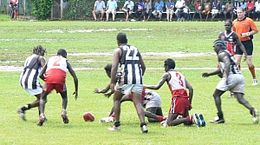| Australian rules football in the Northern Territory | |
|---|---|
 Tiwi Islands Football League Grand Final 05/06 at Nguiu stadium—Mulluwurri vs Pumurali. | |
| Governing body | AFL Northern Territory |
| First played | Darwin 12 February 1916 |
| Registered players | 7,158 (adult) 3,917 (child)[1] |
Club competitions | |
Northern Territory Football League Central Australian Football League Barkly Australian Football League Big Rivers Australian Football League CAFL Country League Elcho Island Football League Gove Australian Football League Groote Eylandt Football League Gunbalanya Football League Lajamanu Football League Maningrida Football League Ngukurr Football League Ramingining Football League Wilurrara Tjataku Football League Tanami Football League Tiwi Islands Football League Wadeye Football League | |
Audience records | |
| Single match | 17,500 (Aboriginal All-Stars vs Carlton; 2002; AFL pre-season practice; Marrara Oval, Darwin) |
In the Northern Territory (NT), Australian rules football is a popular participation and spectator sport, particularly among the many remote Indigenous Australian communities of the outback such as the Tiwi Islands but also in the capital Darwin and other cities particularly Alice Springs. There are more than 15 regional competitions across the territory, the highest profile being the semi-professional Northern Territory Football League based around Darwin and Central Australian Football League around Alice Springs. It is governed by AFL Northern Territory. 7,158 adults and 3,917 children play it, of which about a third are female.[1] Participation per capita has fallen from 18% in 2017 when it had the highest rate for a team sport in Australia[2] to 3.4% in 2024 and fourth behind soccer, basketball and cricket.[1]
The territory's men's team made a single interstate representational appearance at the 1988 Adelaide Bicentennial Carnival. Selected under State of Origin criteria and featuring such names as Maurice Rioli, Michael Long and Michael McLean it went through undefeated to take out the Division 2 premiership with big wins against Tasmania, the VFA and the national amateurs team. In 1993 it was merged with Queensland to create a composite side which has not appeared since. Northern Territory had a standalone representative side in the underage National Championships between 1979 and 2016, this side won three Division 2 titles—Under 16 in 1999, and Under 19 in 2004 and 2012. Since 2021, the Northern Territory Academy has participated in the Talent League. The NT is home to the Indigenous All-Stars and Flying Boomerangs representative teams. The All-Stars hold the current attendance record for any football code in the Territory - 17,500 set in 2002. A professional club, the Northern Territory Football Club (NT Thunder) was formed in 2008 and competed in the second tier semi-national NEAFL competition.
Since the first Australian Football League (AFL) match played in Darwin during the 2004 AFL season, attendances have averaged 9,320. They have steadily declined from a peak of 14,100 in 2006 (featuring the Western Bulldogs). Under the 2020 arrangement with the Gold Coast Suns and Melbourne FC, the NT receives two matches in Darwin (Marrara Oval) and one in Alice Springs (Traeger Park) each year. In addition, Darwin hosted the 2020 Dreamtime match including the first AFL Women's (AFLW) fixture during the 2024 season.[3] The AFL's Gold Coast Suns have access to the best junior talent from the Territory through its recruitment zone and the Gold Coast Suns Academy. In 2021, following a 2018 scoping study, AFL Northern Territory launched an official bid to enter a team into the national AFL competition. This bid is under consideration by the league for entry around 2030.[4]
Since the debut of Reuben Cooper in 1969,[5] over 100 of born-and-raised Territorians have played in the AFL and AFLW. However, a significant percentage have launched their professional football careers from other states, particularly South Australia, Western Australia and Queensland. Nevertheless the sport in 2017 produced more professional players per capita AFL than any other state or territory. Two dynasties from the NT have together produced numerous prominent footballers: the Rioli and Long families. Australian Football Hall of Famer Maurice Rioli was known also for his career in the WAFL prior to playing in Victoria. Hall of Famer Andrew McLeod is often considered the most accomplished AFL player born and raised in the NT, and Hall of Famer Nathan Buckley is the only Territorian to win the Brownlow Medal. Darwin-born Shaun Burgoyne holds both the Territorian AFL games and goals records, with 407 games and 302 goals. Shaun Burgoyne and Cyril Rioli have played in 4 AFL premierships, more than any other Territorian. In the AFLW, Danielle Ponter of the Rioli-Long family is the most prominent NT player, having kicked the most goals and played the most games.
- ^ a b c Cite error: The named reference
participation 2023/24was invoked but never defined (see the help page). - ^ "Participation rates in the NT is greatest of all". AFL Northern Territory. Retrieved 15 March 2018.
- ^ AFLW Dreamtime heads to Darwin By essendonfc.com.au 31 May 2024
- ^ Northern Territory AFL taskforce pushes ahead with ambitious bid to establish locally-based team By Housnia Shams for ABC News 16 Apr 2022
- ^ Morris, Grey (9 May 2008). "First of NT's legion of stars". Northern Territory News.